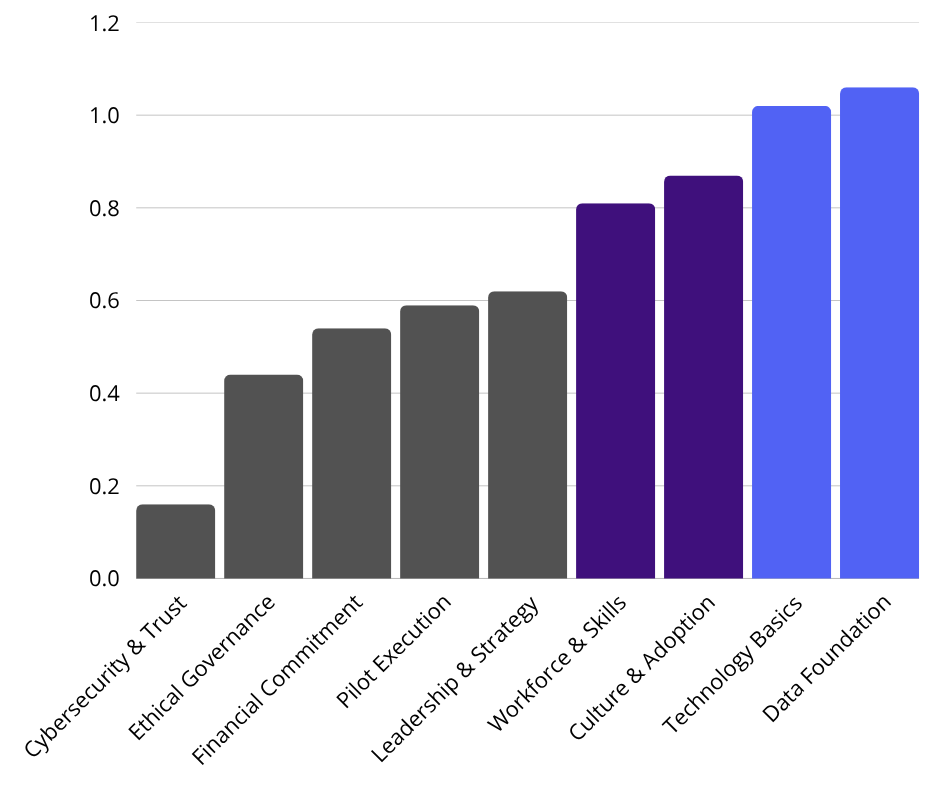Across Canada, small and mid-sized businesses are testing the waters with artificial intelligence, but the data shows they’re still far from ready.

In the World Trade Centre Toronto’s AI Readiness Assessment, 45 firms scored an average of 0.68 on a readiness scale of 0-3, or roughly 23% readiness across nine capabilities. Even the highest results, Data Foundation (1.06) and Technology Basics (1.02), barely clear the first rung of the ladder.
That means most businesses are early in their journey. They’re curious, they’re trying things but they’re not yet turning that energy into measurable impact.
AI Assessment – Aggregated Results by Section

Where We’re Doing Relatively Well
It’s not all bad news. The results show that Canadian SMEs have started to build the basics:
- Data Foundation (1.06): Many firms have begun consolidating data and improving data quality.
- Technology Basics (1.02): Cloud infrastructure and backup systems are becoming common, giving companies the capacity to experiment.
- Workforce & Skills (0.81): Employees are eager and curious — many are already using AI tools, even if they’re learning on their own time.
These are not high scores but are early signs of progress in a new field; the foundation on which more ambitious adoption could grow.
Where We’re Falling Behind
But almost every other area is extremely underdeveloped:
- Cybersecurity & Trust (0.16): Few have tested AI-specific risks or have response plans.
- Ethical Governance (0.44): Oversight of bias and accountability is nearly absent.
- Financial Commitment (0.54): Most firms haven’t written AI into their budgets.
- Leadership & Strategy (0.62): Only two firms have an approved AI roadmap and just one tracks results.
While employees are experimenting, the systems meant to support and protect that experimentation haven’t caught up. This also impairs firms’ ability to lean into what’s working: scaling successful pilots, learning from results, and turning early wins into lasting productivity gains.
Two Ways to Do Strategy
Traditionally, organizational change starts at the top. Executives decide on a strategy, budget for it, and teams execute.
That’s not what’s happening here. Our data shows most SMEs have no AI roadmap and no dedicated budget. Yet employees are already using AI, often informally, to save time and test ideas.
Strategy isn’t leading experimentation; it’s following it.
Experimentation is valuable because it’s where innovation starts. But for those small wins to spread across an organization, they need structure.
Right now, that structure is missing. Few firms have pilot programs, shared playbooks, or systems for capturing what works and repeating it. The result is promising activity that stays isolated.
What leadership needs to build now isn’t control, it’s scaffolding: lightweight frameworks, pilot processes, and ways for ideas to flow across teams. That’s how scattered experiments become collective progress.
From Curiosity to Capability
Canadian SMEs have not yet made the widespread adoption of AI a reality, but they’re learning fast. The next step isn’t to slow down, it’s to connect what’s already happening.
That means:
- Keep experimenting. Curiosity is the engine.
- Add structure. Simple frameworks turn wins into repeatable progress.
- Invest in trust. Build security and oversight before scaling.
- Lead by connecting, not controlling. Make it easy for good ideas to spread.
- Know when to stop. End the experiments that aren’t working and redirect resources toward what is.
Canadian SMEs don’t lack ideas or ambition, they lack the systems to turn those ideas into action. Building that bridge, from curiosity to capability, is where the real opportunity lies.
See Where You Stand
Take the AI Readiness Assessment to see where your firm stands, identify your strengths and gaps, and get practical next steps for building AI capability.


